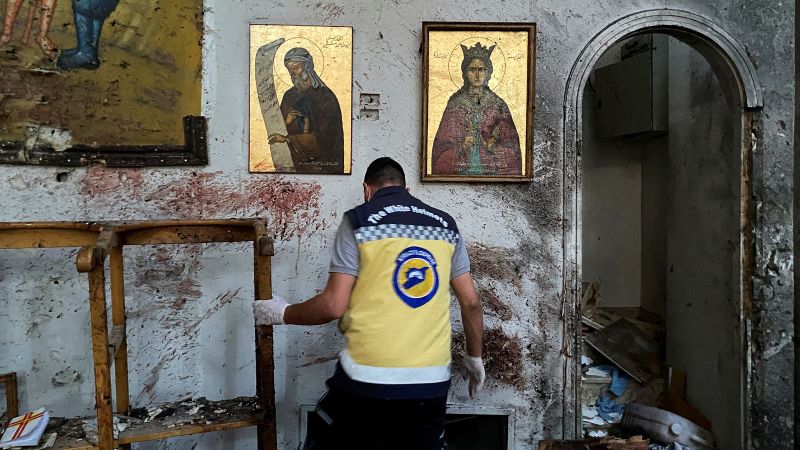Tragedy Strikes Damascus: Suicide Bombing at Mar Elias Church Claims 20 Lives

In a harrowing act of violence, the Mar Elias Church in Damascus, Syria, became the latest site of tragedy as a suicide bomber claimed the lives of at least 20 individuals and left 52 others injured. This attack, described by Syria's Ministry of Interior Affairs as the work of a "suicide bomber affiliated with the terrorist organization ISIS," has sent shockwaves through the international community and reignited fears of escalating violence in the region.
The attack unfolded during a mass at the Greek Orthodox church, a sacred moment shattered by gunfire and the subsequent detonation of an explosive vest. The scene inside the church was one of devastation, with shattered glass, broken chairs, and blood marking the aftermath of the explosion. The Syrian civil defense, known as the White Helmets, swiftly responded, working tirelessly to transport the injured to hospitals and secure the area.
The Greek Orthodox Patriarchate of Antioch, in a poignant statement, condemned the "treacherous hand of evil" that struck their community. They mourned the loss of "numerous martyrs" and called for prayers for the wounded and the grieving faithful. Their message was one of resilience, emphasizing their unwavering commitment to their faith and rejecting fear and intimidation.
International condemnation was swift and widespread. The United Nations Special Envoy for Syria, Geir O. Pedersen, expressed his "outrage" at what he termed a "heinous crime," urging unity against terrorism and extremism. Similarly, the United States’ Special Envoy for Syria, Thomas Barrack, denounced the attack as an act of "cowardice," underscoring its incompatibility with the vision of a tolerant and inclusive Syria.
The attack has drawn rebuke from a broad coalition of nations, including Turkey, Jordan, Iraq, Israel, and several European countries, all standing in solidarity against the senseless violence. As Syria grapples with the aftermath of this attack, the international community's response underscores a collective rejection of terrorism and a call for peace and reconciliation in a region long plagued by conflict.
🔮 Fortellr Predicts
Confidence: 85%
The recent attack on the Mar Elias Church in Damascus represents a significant attempt by ISIS to re-assert its presence in the region by targeting Christian minorities, aiming to instigate sectarian tensions and exhibit operational reach within Syria's capital. Historically, attacks on such religious institutions often provoke governmental and international condemnations, leading to heightened security measures and intensified military campaigns against terrorist havens. The Syrian government's immediate response will likely involve tightening security around key infrastructures and religious sites, while also increasing military operations in ISIS stronghold areas to dismantle any resurgence of terrorist networks. This reaction will be supported by regional intelligence collaboration, as neighboring countries increase vigilance to curtail the potential spread of terrorism across borders. Internationally, this attack could spark renewed discussions at forums such as the United Nations, urging for cohesive counter-terrorism strategies and emphasizing the need for humanitarian aid to stabilize affected communities. Over the long term, this event may catalyze shifts in counter-terrorism policies across the Middle East, as nations seek to balance security with civil rights. However, ongoing geopolitical tensions, such as the Israel-Iran conflict, and the complex Syrian civil war dynamics may complicate unified regional efforts, potentially leading to fragmented or asymmetric responses.